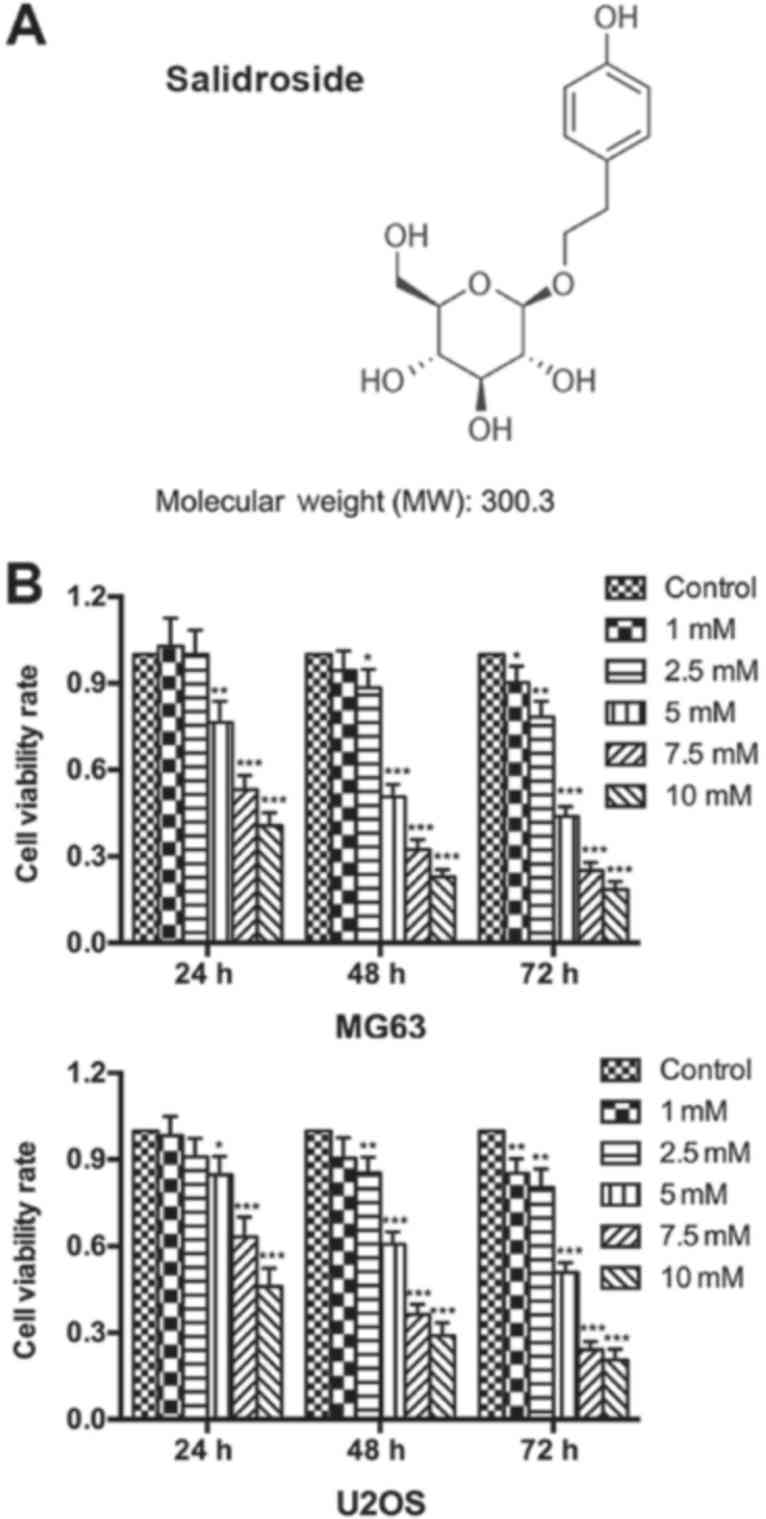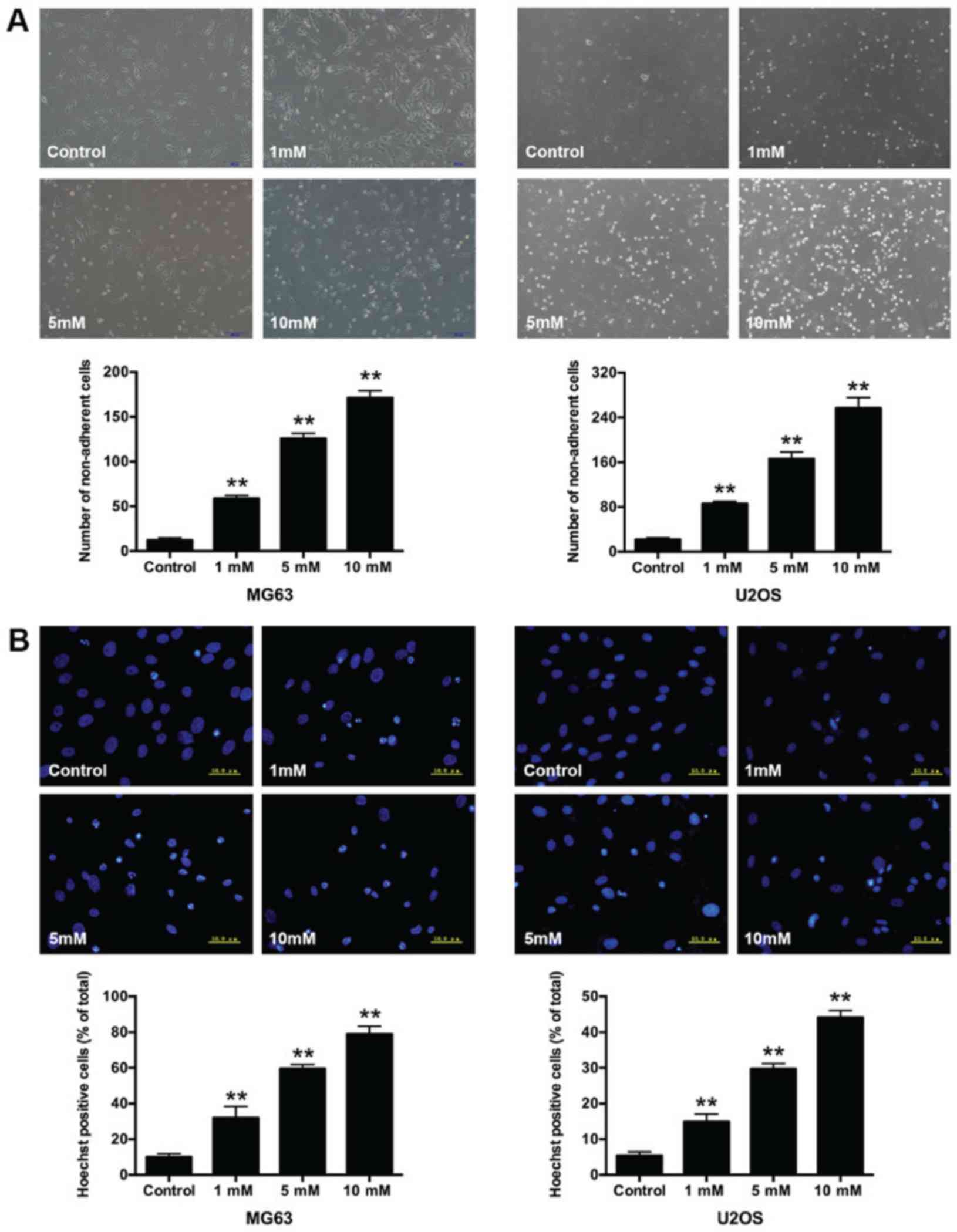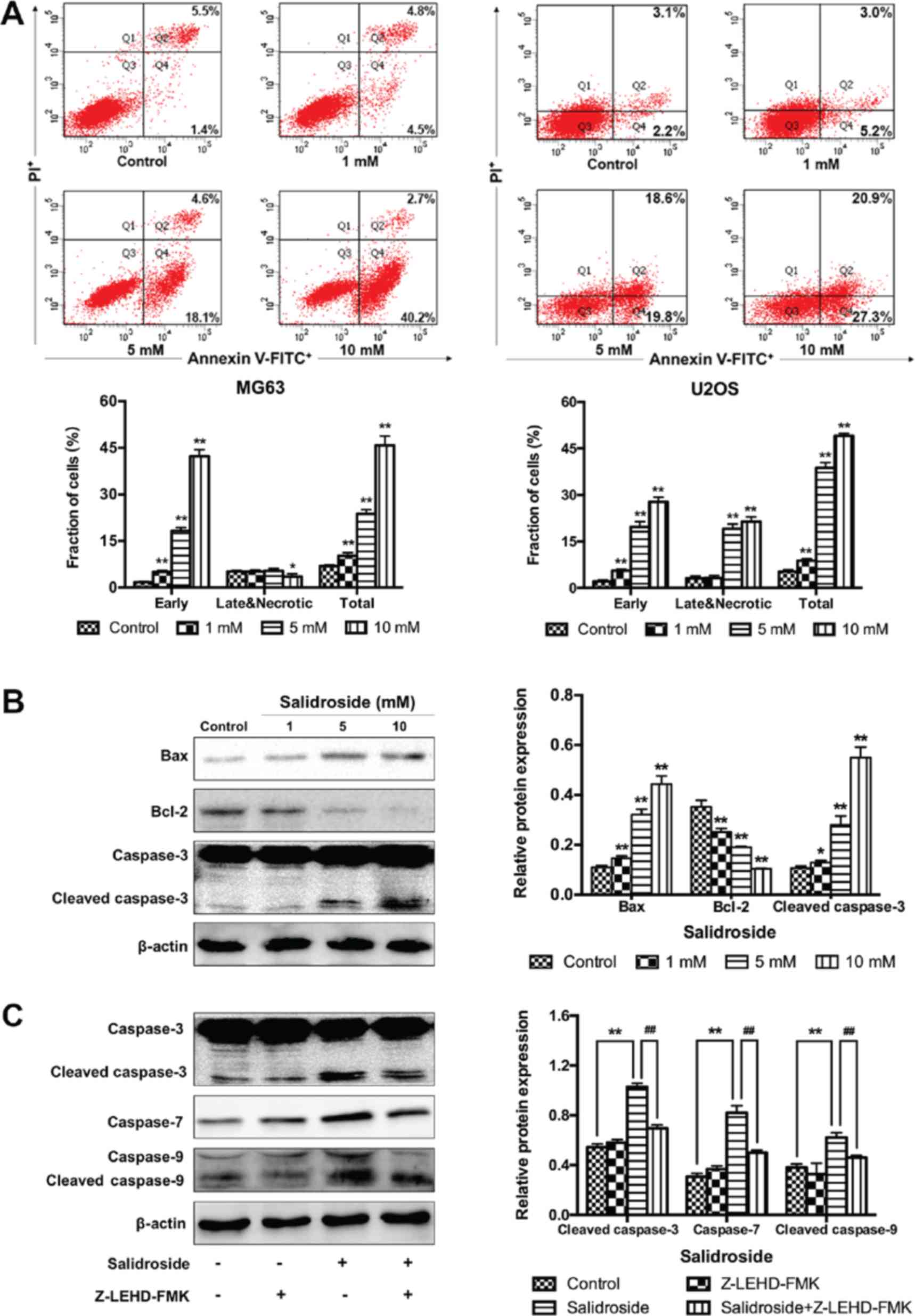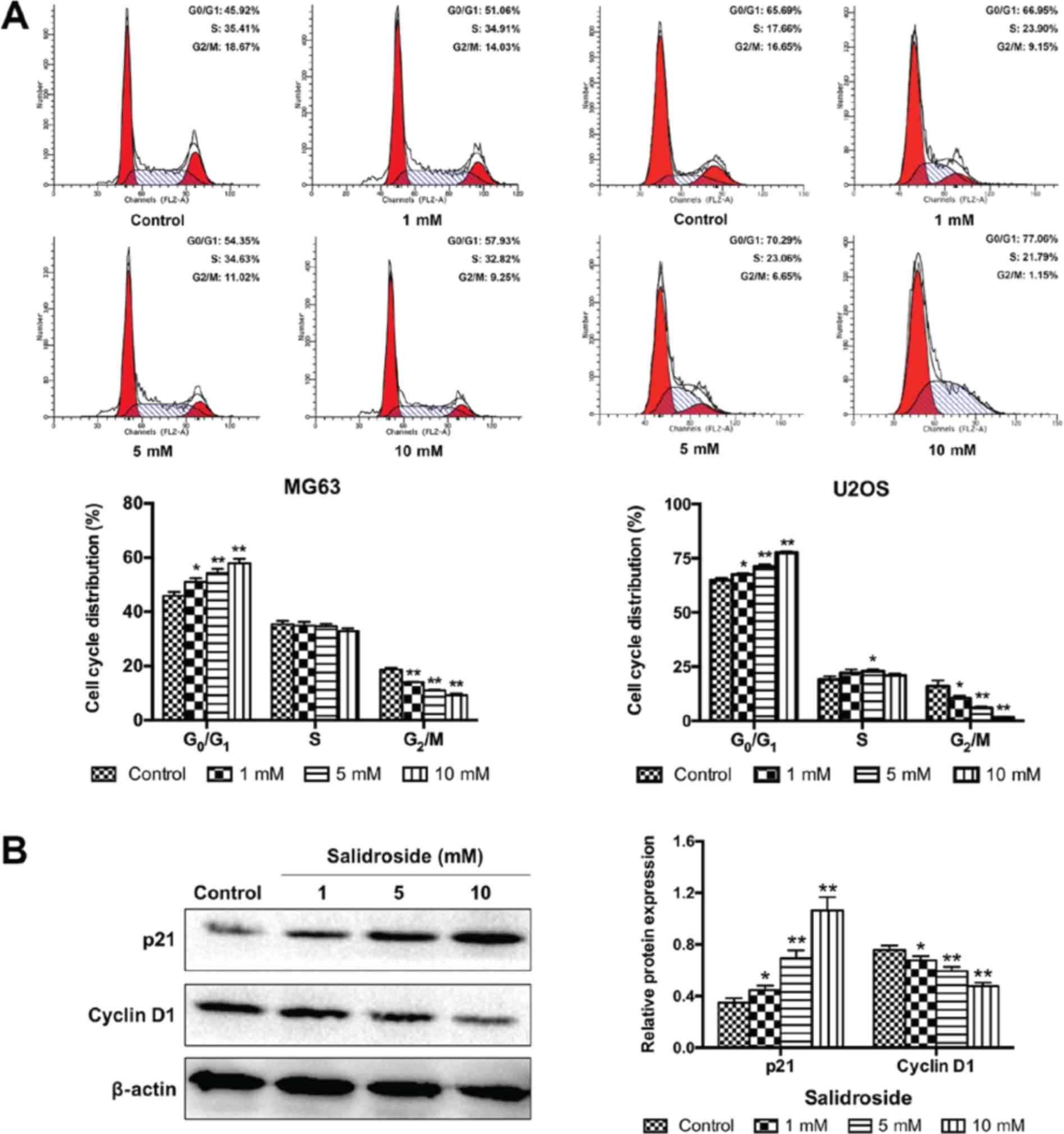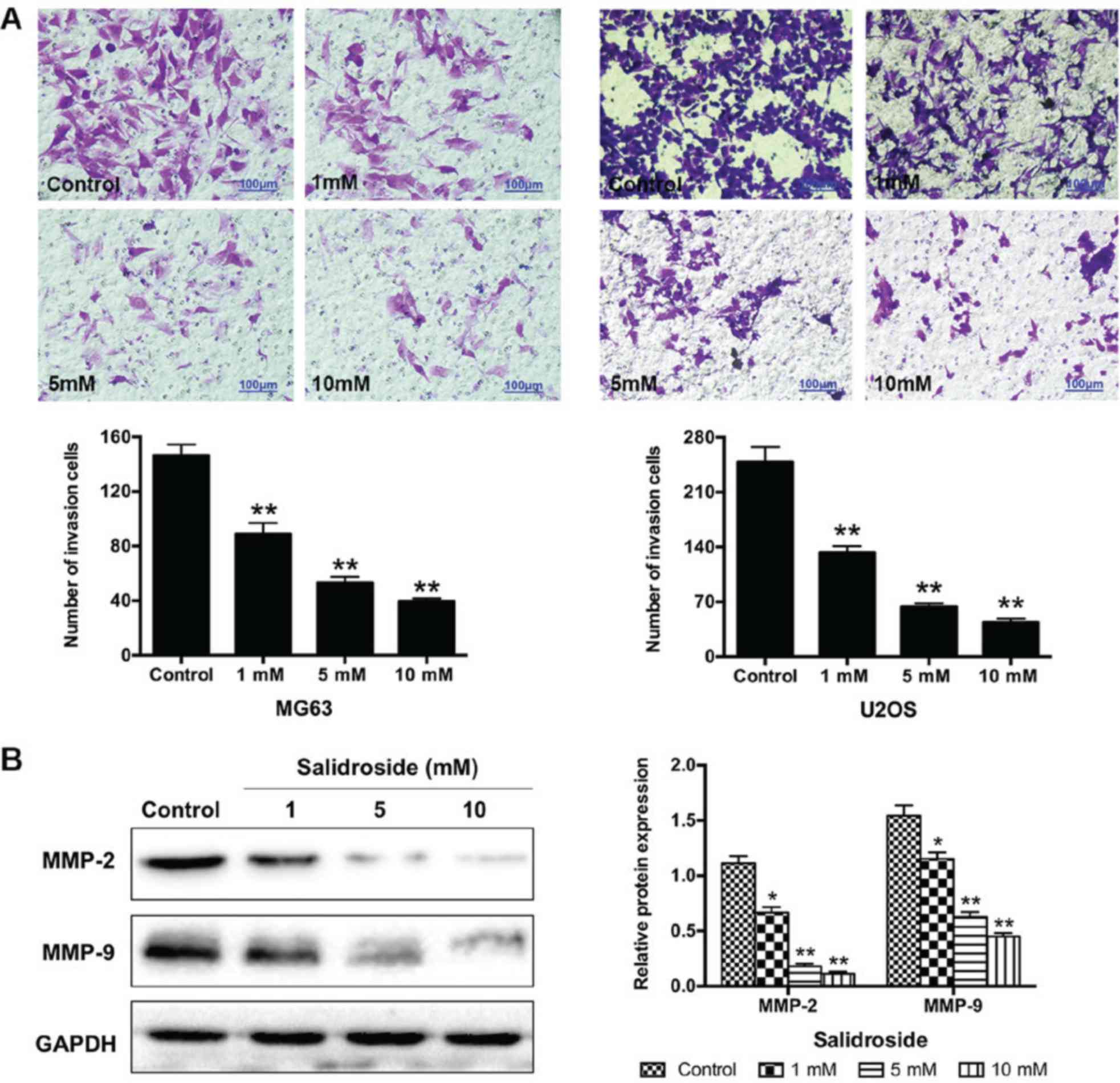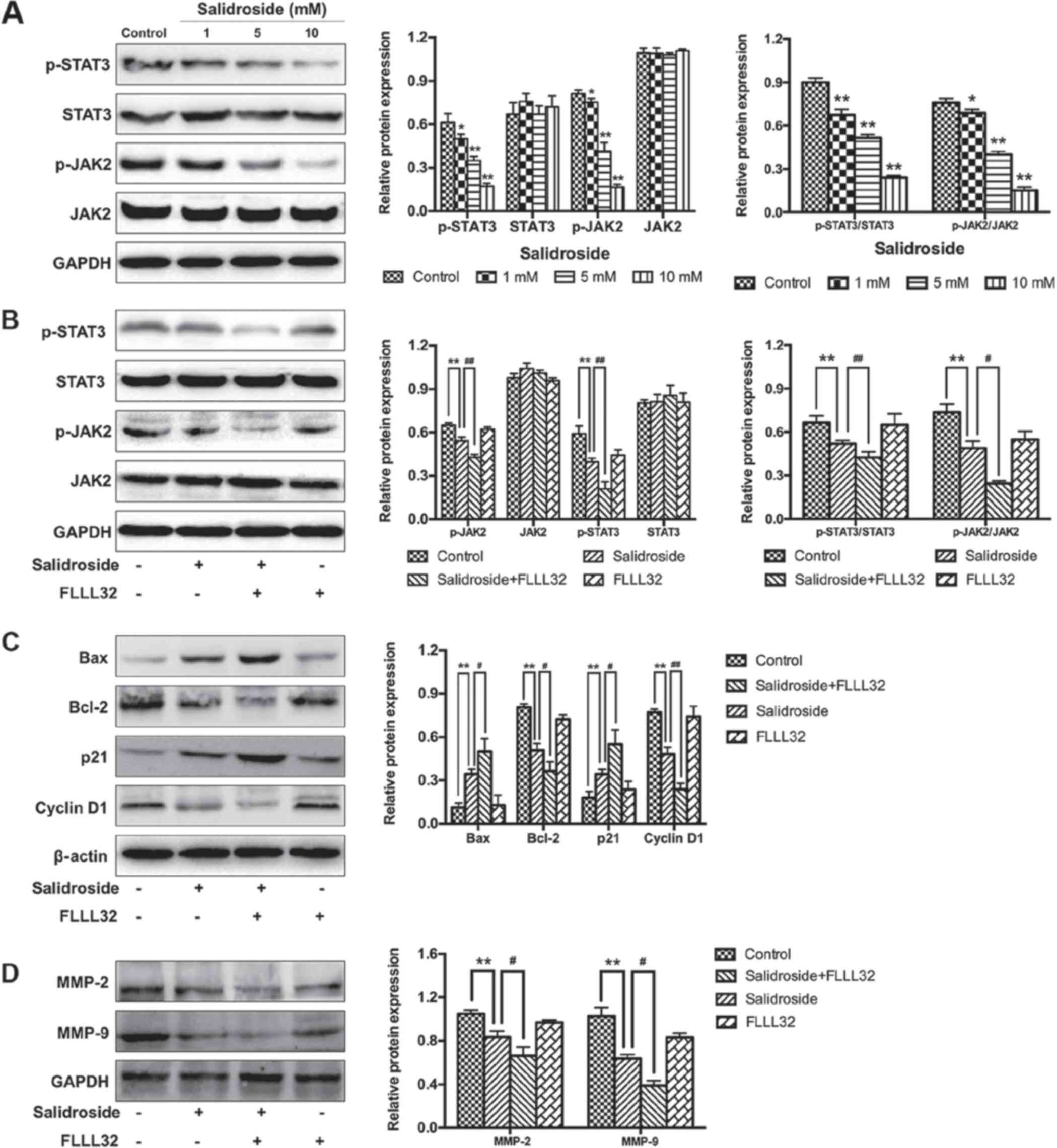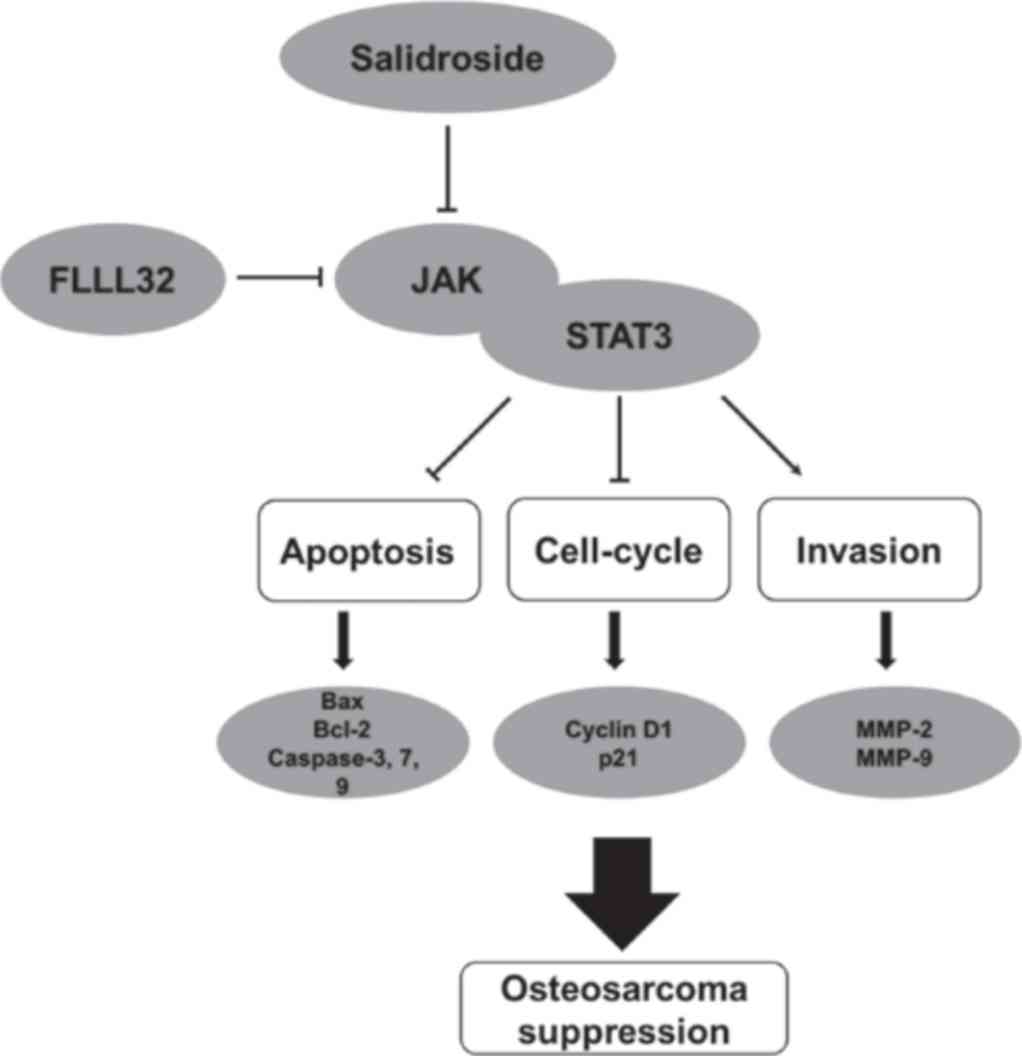|
1
|
Ottaviani G and Jaffe N: The epidemiology
of osteosarcoma. Cancer Treat Res. 152:3–13. 2009. View Article : Google Scholar
|
|
2
|
Lewis VO: What's new in musculoskeletal
oncology. J Bone Joint Surg Am. 91:1546–1556. 2009. View Article : Google Scholar : PubMed/NCBI
|
|
3
|
Dominkus M, Darwish E and Funovics P:
Reconstruction of the pelvis after resection of malignant bone
tumours in children and adolescents. Recent Results Cancer Res.
179:85–111. 2009. View Article : Google Scholar : PubMed/NCBI
|
|
4
|
Fuchs B and Pritchard DJ: Etiology of
osteosarcoma. Clin Orthop Relat Res. 397:40–52. 2002. View Article : Google Scholar
|
|
5
|
Picci P: Osteosarcoma (osteogenic
sarcoma). Orphanet J Rare Dis. 2:62007. View Article : Google Scholar : PubMed/NCBI
|
|
6
|
Rosen G, Marcove RC, Caparros B, Nirenberg
A, Kosloff C and Huvos AG: Primary osteogenic sarcoma: The
rationale for preoperative chemotherapy and delayed surgery.
Cancer. 43:2163–2177. 1979. View Article : Google Scholar : PubMed/NCBI
|
|
7
|
Kulchitsky VA, Potkin VI, Zubenko YS,
Chernov AN, Talabaev MV, Demidchik YE, Petkevich SK, Kazbanov VV,
Gurinovich TA, Roeva MO, et al: Cytotoxic effects of
chemotherapeutic drugs and heterocyclic compounds at application on
the cells of primary culture of neuroepithelium tumors. Med Chem.
8:22–32. 2012. View Article : Google Scholar : PubMed/NCBI
|
|
8
|
Tolonen A, Pakonen M, Hohtola A and
Jalonen J: Phenylpropanoid glycosides from Rhodiola rosea. Chem
Pharm Bull (Tokyo). 51:467–470. 2003. View Article : Google Scholar
|
|
9
|
Zhu Y, Zhang YJ, Liu WW, Shi AW and Gu N:
Salidroside suppresses HUVECs cell injury induced by oxidative
stress through activating the Nrf2 signaling pathway. Molecules.
21:212016. View Article : Google Scholar
|
|
10
|
Yang DW, Kang OH, Lee YS, Han SH, Lee SW,
Cha SW, Seo YS, Mun SH, Gong R, Shin DW, et al: Anti-inflammatory
effect of salidroside on phorbol-12-myristate-13-acetate plus
A23187-mediated inflammation in HMC-1 cells. Int J Mol Med.
38:1864–1870. 2016. View Article : Google Scholar : PubMed/NCBI
|
|
11
|
Zhang L, Yu H, Zhao X, Lin X, Tan C, Cao G
and Wang Z: Neuroprotective effects of salidroside against
beta-amyloid-induced oxidative stress in SH-SY5Y human
neuroblastoma cells. Neurochem Int. 57:547–555. 2010. View Article : Google Scholar : PubMed/NCBI
|
|
12
|
Zhang H, Shen WS, Gao CH, Deng LC and Shen
D: Protective effects of salidroside on epirubicin-induced early
left ventricular regional systolic dysfunction in patients with
breast cancer. Drugs R D. 12:101–106. 2012. View Article : Google Scholar : PubMed/NCBI
|
|
13
|
Sun C, Wang Z, Zheng Q and Zhang H:
Salidroside inhibits migration and invasion of human fibrosarcoma
HT1080 cells. Phytomedicine : international journal of phytotherapy
and phytopharmacology. 19:355–363. 2012. View Article : Google Scholar
|
|
14
|
Liu Z, Li X, Simoneau AR, Jafari M and Zi
X: Rhodiola rosea extracts and salidroside decrease the growth of
bladder cancer cell lines via inhibition of the mTOR pathway and
induction of autophagy. Mol Carcinog. 51:257–267. 2012. View Article : Google Scholar
|
|
15
|
Wang J, Li JZ, Lu AX, Zhang KF and Li BJ:
Anticancer effect of salidroside on A549 lung cancer cells through
inhibition of oxidative stress and phospho-p38 expression. Oncol
Lett. 7:1159–1164. 2014. View Article : Google Scholar : PubMed/NCBI
|
|
16
|
Zhao G, Shi A, Fan Z and Du Y: Salidroside
inhibits the growth of human breast cancer in vitro and in vivo.
Oncol Rep. 33:2553–2560. 2015. View Article : Google Scholar : PubMed/NCBI
|
|
17
|
Lv C, Huang Y, Liu ZX, Yu D and Bai ZM:
Salidroside reduces renal cell carcinoma proliferation by
inhibiting JAK2/STAT3 signaling. Cancer Biomark. 17:41–47. 2016.
View Article : Google Scholar : PubMed/NCBI
|
|
18
|
Denizot F and Lang R: Rapid colorimetric
assay for cell growth and survival. Modifications to the
tetrazolium dye procedure giving improved sensitivity and
reliability. J Immunol Methods. 89:271–277. 1986. View Article : Google Scholar : PubMed/NCBI
|
|
19
|
Faisham WI, Mat Saad AZ, Alsaigh LN, Nor
Azman MZ, Kamarul Imran M, Biswal BM, Bhavaraju VM, Salzihan MS,
Hasnan J, Ezane AM, et al: Prognostic factors and survival rate of
osteosarcoma: A single-institution study. Asia Pac J Clin Oncol.
13:e104-e1102017. View Article : Google Scholar
|
|
20
|
Hu X, Lin S, Yu D, Qiu S, Zhang X and Mei
R: A preliminary study: The anti-proliferation effect of
salidroside on different human cancer cell lines. Cell Biol
Toxicol. 26:499–507. 2010. View Article : Google Scholar : PubMed/NCBI
|
|
21
|
Guo Y, Zhao Y, Zheng C, Meng Y and Yang Y:
Synthesis, biological activity of salidroside and its analogues.
Chem Pharm Bull (Tokyo). 58:1627–1629. 2010. View Article : Google Scholar
|
|
22
|
Farzaei MH, Bahramsoltani R and Rahimi R:
Phytochemicals as adjunctive with conventional anticancer
therapies. Curr Pharm Des. 22:4201–4218. 2016. View Article : Google Scholar : PubMed/NCBI
|
|
23
|
Zhang L, Yu H, Sun Y, Lin X, Chen B, Tan
C, Cao G and Wang Z: Protective effects of salidroside on hydrogen
peroxide-induced apoptosis in SH-SY5Y human neuroblastoma cells.
Eur J Pharmacol. 564:18–25. 2007. View Article : Google Scholar : PubMed/NCBI
|
|
24
|
Li H and Chen C: Inhibition of autophagy
enhances synergistic effects of Salidroside and anti-tumor agents
against colorectal cancer. BMC Complement Altern Med. 17:5382017.
View Article : Google Scholar : PubMed/NCBI
|
|
25
|
Qi Z, Tang T, Sheng L, Ma Y, Liu Y, Yan L,
Qi S, Ling L and Zhang Y: Salidroside inhibits the proliferation
and migration of gastric cancer cells via suppression of
Src-associated signaling pathway activation and heat shock protein
70 expression. Mol Med Rep. 18:147–156. 2018.PubMed/NCBI
|
|
26
|
Normile D: Cell proliferation. Common
control for cancer, stem cells. Science. 298:18692002. View Article : Google Scholar : PubMed/NCBI
|
|
27
|
Hu X, Ma J, Vikash V, Li J, Wu D, Liu Y,
Zhang J and Dong W: Thymoquinone augments cisplatin-induced
apoptosis on esophageal carcinoma through mitigating the activation
of JAK2/STAT3 pathway. Dig Dis Sci. 63:126–134. 2018. View Article : Google Scholar
|
|
28
|
Lv C, Hao Y, Han Y, Zhang W, Cong L, Shi Y
and Tu G: Role and mechanism of microRNA-21 in
H2O2-induced apoptosis in bone marrow
mesenchymal stem cells. J Clin Neurosci. 27:154–160. 2016.
View Article : Google Scholar : PubMed/NCBI
|
|
29
|
Sherr CJ: Cancer cell cycles. Science.
274:1672–1677. 1996. View Article : Google Scholar : PubMed/NCBI
|
|
30
|
Lin W, Zhu X, Yang S, Chen X, Wang L,
Huang Z, Ding Y, Huang L and Lv C: MicroRNA-203 inhibits
proliferation and invasion, and promotes apoptosis of osteosarcoma
cells by targeting Runt-related transcription factor 2. Biomed
Pharmacother. 91:1075–1084. 2017. View Article : Google Scholar : PubMed/NCBI
|
|
31
|
Hu X, Zhang X, Qiu S, Yu D and Lin S:
Salidroside induces cell-cycle arrest and apoptosis in human breast
cancer cells. Biochem Biophys Res Commun. 398:62–67. 2010.
View Article : Google Scholar : PubMed/NCBI
|
|
32
|
Tesser-Gamba F, Lopes LJ, Petrilli AS and
Toledo SR: MAPK7 gene controls proliferation, migration and cell
invasion in osteo-sarcoma. Mol Carcinog. 55:1700–1713. 2016.
View Article : Google Scholar
|
|
33
|
Yu C and Wang W: Relationship between P15
gene mutation and formation and metastasis of malignant
osteosarcoma. Med Sci Monit. 22:656–661. 2016. View Article : Google Scholar : PubMed/NCBI
|
|
34
|
Cui Y, Zhu JJ, Ma CB, Cui K, Wang F, Ni SH
and Zhang ZY: Genetic polymorphisms in MMP 2, 3 and 9 genes and the
susceptibility of osteosarcoma in a Chinese Han population.
Biomarkers. 21:160–163. 2016. View Article : Google Scholar : PubMed/NCBI
|
|
35
|
Lv C, Yang S, Chen X, Zhu X, Lin W, Wang
L, Huang Z, Wang M and Tu G: MicroRNA-21 promotes bone mesenchymal
stem cells migration in vitro by activating PI3K/Akt/MMPs pathway.
J Clin Neurosci. 46:156–162. 2017. View Article : Google Scholar : PubMed/NCBI
|
|
36
|
Fan XJ, Wang Y, Wang L and Zhu M:
Salidroside induces apoptosis and autophagy in human colorectal
cancer cells through inhibition of PI3K/Akt/mTOR pathway. Oncol
Rep. 36:3559–3567. 2016. View Article : Google Scholar : PubMed/NCBI
|
|
37
|
Kang DY, Sp N, Kim DH, Joung YH, Lee HG,
Park YM and Yang YM: Salidroside inhibits migration, invasion and
angiogenesis of MDA-MB 231 TNBC cells by regulating EGFR/Jak2/STAT3
signaling via MMP2. Int J Oncol. 53:877–885. 2018.PubMed/NCBI
|
|
38
|
Bill MA, Nicholas C, Mace TA, Etter JP, Li
C, Schwartz EB, Fuchs JR, Young GS, Lin L, Lin J, et al:
Structurally modified curcumin analogs inhibit STAT3
phosphorylation and promote apoptosis of human renal cell carcinoma
and melanoma cell lines. PLoS One. 7:e407242012. View Article : Google Scholar : PubMed/NCBI
|
|
39
|
Sun KX, Xia HW and Xia RL: Anticancer
effect of salidroside on colon cancer through inhibiting JAK2/STAT3
signaling pathway. Int J Clin Exp Pathol. 8:615–621.
2015.PubMed/NCBI
|
|
40
|
Mahmoud AM and Abd El-Twab SM: Caffeic
acid phenethyl ester protects the brain against hexavalent chromium
toxicity by enhancing endogenous antioxidants and modulating the
JAK/STAT signaling pathway. Biomed Pharmacother. 91:303–311. 2017.
View Article : Google Scholar : PubMed/NCBI
|
|
41
|
Tian Y, Zhang W, Xia D, Modi P, Liang D
and Wei M: Postconditioning inhibits myocardial apoptosis during
prolonged reperfusion via a JAK2 STAT3-Bcl-2 pathway. J Biomed Sci.
18:532011. View Article : Google Scholar
|
|
42
|
Wu KJ, Huang JM, Zhong HJ, Dong ZZ,
Vellaisamy K, Lu JJ, Chen XP, Chiu P, Kwong DWJ, Han QB, et al: A
natural product-like JAK2/STAT3 inhibitor induces apoptosis of
malignant melanoma cells. PLoS One. 12:e01771232017. View Article : Google Scholar : PubMed/NCBI
|
|
43
|
Shokoohinia Y, Jafari F, Mohammadi Z,
Bazvandi L, Hosseinzadeh L, Chow N, Bhattacharyya P, Farzaei MH,
Farooqi AA, Nabavi SM, et al: Potential anticancer properties of
osthol: A comprehensive mechanistic review. Nutrients. 10:102018.
View Article : Google Scholar
|
|
44
|
Shi X, Zhao W, Yang Y, Wu S and Lv B:
Salidroside could enhance the cytotoxic effect of L-OHP on
colorectal cancer cells. Mol Med Rep. 17:51–58. 2018.
|















